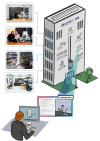Differences
This shows you the differences between two versions of the page.
| Both sides previous revisionPrevious revisionNext revision | Previous revisionNext revisionBoth sides next revision | ||
| team:daniel_nyga [2017/06/16 09:27] – [Dissertation] nyga | team:daniel_nyga [2018/07/03 10:52] – [Teaching] nyga | ||
|---|---|---|---|
| Line 2: | Line 2: | ||
| =====Dr.rer.nat. Daniel Nyga====== | =====Dr.rer.nat. Daniel Nyga====== | ||
| | {{: | | {{: | ||
| - | |::: ||Research Staff\\ \\ || | + | |::: ||Postdoctoral Researcher\\ \\ || |
| |:::|Room: |1.77| | |:::|Room: |1.77| | ||
| - | |:::|Tel: |--49 -421 218 64008| | + | |:::|Tel: |--49 -421 218 64010| |
| |:::|Fax: |--49 -421 218 64047| | |:::|Fax: |--49 -421 218 64047| | ||
| |:::|Mail: |< | |:::|Mail: |< | ||
| Line 31: | Line 31: | ||
| vagueness and ambiguity in natural language and infer missing | vagueness and ambiguity in natural language and infer missing | ||
| information pieces that are required to render an instruction | information pieces that are required to render an instruction | ||
| - | executable by a robot. To this end, \prac formulates the problem of | + | executable by a robot. To this end, PRAC formulates the problem of |
| instruction interpretation as a reasoning problem in first-order | instruction interpretation as a reasoning problem in first-order | ||
| probabilistic knowledge bases. In particular, the system uses Markov | probabilistic knowledge bases. In particular, the system uses Markov | ||
| Line 51: | Line 51: | ||
| showcase that PRAC is capable of closing the loop from | showcase that PRAC is capable of closing the loop from | ||
| natural-language instructions to their execution by a robot. | natural-language instructions to their execution by a robot. | ||
| + | |||
| + | ====Master' | ||
| + | |||
| + | [[https:// | ||
| ====Projects==== | ====Projects==== | ||
| - | Daniel Nyga's research interests revolve around topics on Artificial Intelligence and Data Science in general, as well as Machine Learning, Data Mining and Pattern Recognition techniques. In particular, he is interested in probabilistic graphical and relational knowledge representation, | + | Daniel Nyga's research interests revolve around topics on Artificial Intelligence and Data Science in general, as well as Machine Learning, Data Mining and Pattern Recognition techniques. In particular, he is interested in probabilistic graphical and relational knowledge representation, |
| He was involved in the European FP7 research projects [[http:// | He was involved in the European FP7 research projects [[http:// | ||
| Line 59: | Line 63: | ||
| He is the lead developer in the projects [[http:// | He is the lead developer in the projects [[http:// | ||
| - | His GitHub profile can be found [[http:// | + | His GitHub profile can be found [[http:// |
| Line 70: | Line 74: | ||
| * Data Mining/ | * Data Mining/ | ||
| * Automated Learning/ | * Automated Learning/ | ||
| - | * Natural-Language Understanding | + | * Natural-language understanding |
| ====Teaching==== | ====Teaching==== | ||
| + | * Foundations of Artificial Intelligence ([[https:// | ||
| + | * AI: Knowledge Acquisition and Representation ([[https:// | ||
| * Master Seminar: Data Mining and Data Analytics ([[http:// | * Master Seminar: Data Mining and Data Analytics ([[http:// | ||
| * AI: Knowledge Acquisition and Representation ([[https:// | * AI: Knowledge Acquisition and Representation ([[https:// | ||
| Line 90: | Line 96: | ||
| * To see what no robot has seen before - Recognizing objects based on natural-language descriptions (Master' | * To see what no robot has seen before - Recognizing objects based on natural-language descriptions (Master' | ||
| * Web-enabled Learning of Models for Word Sense Disambiguation (Bachelor Thesis, Stephan Epping) | * Web-enabled Learning of Models for Word Sense Disambiguation (Bachelor Thesis, Stephan Epping) | ||
| - | * Grounding Words to Objects: A Joint Model for Co-reference and Entity Resolution Using Markov Logic Networks for Robot Instruction Processing (Diploma Thesis, Florian Meyer) | + | * Grounding Words to Objects: A Joint Model for Co-reference and Entity Resolution Using Markov Logic Networks for Robot Instruction Processing (Diploma Thesis, Florian Meyer) |
| - | | + | |
| ====== Publications ====== | ====== Publications ====== | ||
| Line 98: | Line 103: | ||
| < | < | ||
| </ | </ | ||
| + | |||
Prof. Dr. hc. Michael Beetz PhD
Head of Institute
Contact via
Andrea Cowley
assistant to Prof. Beetz
ai-office@cs.uni-bremen.de
Discover our VRB for innovative and interactive research

Memberships and associations:











